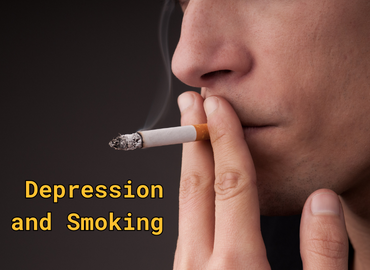Depression and Smoking
Smoking vegetable matter has been practiced in one form or another for thousands of years. Humanity uses a myriad of implements to burn and inhale smoke from dozens of plants, like tobacco, cannabis, and damiana. Reams of material has and will be written about the effects of smoking on the mind and body, but today, we want to take a brief look at the relationship between nicotine (as imbibed through commercially produced and rolled tobacco cigarettes) and depressive and anxiety-related disorders. In this context, we are also using the term “smoking” to describe a regular habit that, if stopped, would cause the person to go into withdrawal.
In general, smoking a cigarette results in a feeling of improved mood for a short period of time. This is because nicotine, the chemical compound in cigarettes that causes the desired effect, is a stimulant. There is a part of the brain called the limbic system. This area has a role in managing our senses of pleasure and stress relief. When nicotine binds to the cell networks in the limbic system, it delivers dopamine. Dopamine is a neurotransmitter that produces feelings of pleasure and is informally nicknamed “Dr. Feelgood.” This makes it very easy to develop a habit.
Is there a relationship between depression/anxiety and smoking cigarettes? Are people depressed and/or anxious because they smoke, or do they smoke because they are depressed and/or anxious? This article gives an overview of how results from 148 studies were put together and found positive associations between smoking cigarettes and depression/anxiety in both directions. Meaning that there was an association whether the mental illness was found first or whether the habit was developed first. Results were categorized by factors like when the habit started and how much the smoker uses every day. There were no discernable patterns according to ethnicity, gender, or diagnostic tests.
What does this mean? If someone is already experiencing depression/anxiety, they may feel a short-term lift from using nicotine. But an insidious characteristic of addiction is that when it stimulates the release of a neurotransmitter like dopamine, the body often gets too used to the cue and does not produce or transmit the neurotransmitter the way it is supposed to without use of the drug. That is one reason why quitting can be so difficult.
The brain is just another part of the body, and the damage that nicotine cigarettes do to the rest of one’s body can itself affect one’s mental health. This damage includes tooth decay, greater risk of stroke, premature aging, and various cancers. Smoking is a costly habit and can affect one’s relationships and routine.
Seeing a therapist is a good idea while quitting smoking. They can help one process experiences and feelings while going through withdrawal, and when nicotine is absent from the system, one can’t say what it will leave behind. The patient may fine overall, or experience a reduction in depression/anxiety, or feel the same depression/anxiety, if any, that they experienced before taking up smoking. Many smokers have been using long enough to have forgotten their mental state when they acquired the habit. Some former smokers find that their anxiety/depression is worse after they stop smoking. The patient’s general physician, therapist, psychiatrist, and any other medical professionals involved can help create a treatment plan to give the patient a better quality of life. This may include medication, and it can take time to discover what medication and what dosage is best for the patient.
For more information and to schedule an appointment, contact us on our website or call (585) 442-6960.




